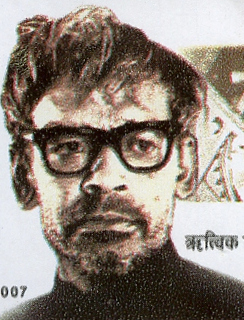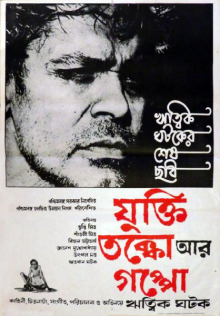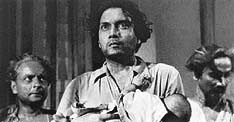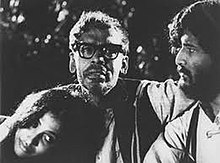
Ritwik Kumar Ghatak was a noted Indian film director, screenwriter and playwright. Along with prominent contemporary Bengali filmmakers like Satyajit Ray, Tapan Sinha and Mrinal Sen, his cinema is primarily remembered for its meticulous depiction of social reality, partition and feminism. He won the National Film Award's Rajat Kamal Award for Best Story in 1974 for his Jukti Takko Aar Gappo and Best Director's Award from Bangladesh Cine Journalist's Association for Titash Ekti Nadir Naam. The Government of India honoured him with the Padma Shri for Arts in 1970.

Meghe Dhaka Tara is a 1960 film written and directed by Ritwik Ghatak, based on a social novel by Shaktipada Rajguru with the same title. It stars Supriya Choudhury, Anil Chatterjee, Gita Dey, Bijon Bhattacharya, Niranjan Roy, and Gyanesh Mukherjee. It was part of a trilogy consisting of Meghe Dhaka Tara (1960), Komal Gandhar (1961), and Subarnarekha (1962), all dealing with the aftermath of the Partition of Bengal during the Partition of India in 1947 and the refugees coping with it.

Madhabi Chakraborty is an Indian actress. She won the National Film Award for Best Actress for her performance in the Bengali film Dibratrir Kabya. She has acted in some of the most critically acclaimed films in Bengali cinema and is considered one of the great actresses of Bengali cinema.
Several fiction, non-fiction and cinemas were based on Kolkata or depicted Kolkata from certain point of views. Some of such works are listed here.

Bijon Bhattacharya was an Indian theatre and film actor from West Bengal. He was an eminent playwright and dramatist.
Ustad Bahadur Khan was an Indian sarod player and film score composer.

Jukti Takko Aar Gappo is a 1974 Bengali film directed by auteur of Indian cinema Ritwik Ghatak. Jukti Takko Aar Gappo was Ritwik Ghatak's last film. The film was believed to have a cinematography way ahead of its time. The film won National Film Award's Rajat Kamal Award for Best Story in 1974.
Saswata Chatterjee is an Indian actor of television and films based in Kolkata. Born to actor Subhendu Chatterjee, Saswata Chatterjee began his career with a Hindi serial directed by Saibal Mitra, based on Samaresh Majumdar's Kaalpurush. He gained popularity by portraying the character of Topshe in a Feluda-based television series directed by Sandip Ray. His acting in many Bengali films has been praised by the critics, including his portrayal of a Ritwik Ghatak-inspired character in the 2013 film Meghe Dhaka Tara. He enjoyed success at the national level in Sujoy Ghosh's 2012 blockbuster Hindi film, Kahaani, where he played Bob Biswas, an assassin.

Komal Gandhar, also known as A Soft Note on a Sharp Scale, is a 1961 Bengali film written and directed by legendary film maker Ritwik Ghatak. The title refers to the Hindustani equivalent of "E-flat". It was part of the trilogy composed of Meghe Dhaka Tara (1960), Komal Gandhar and Subarnarekha (1962), all dealing with the aftermath of the Partition of India in 1947 and the refugees coping with it, though this was the most optimistic film of his oeuvre. The film explores three themes juxtaposed in the narrative: the dilemma of Anusuya, the lead character, the divided leadership of IPTA, and the fallout from the partition of India.

Ananya Chatterjee is an Indian actress who works in Bengali films. Known for her role in Abahoman which won her a National Award. She started her career as a TV actress. She acted in several TV serials and films, including three directed by Anjan Dutt. Her role as the muse of a married director in Abahoman, directed by Rituparno Ghosh, won her the National Film Award for Best Actress.
Tripti Mitra was a popular Indian actress of Bengali theatre and films, and wife of Sombhu Mitra, noted theatre director, with whom she co-founded pioneering theatre group Bohurupee in 1948. She has acted in films like Jukti Takko Aar Gappo and Dharti Ke Lal.

Chinnamul was a 1950 Bengali film directed by Nemai Ghosh. This was the first Indian film that dealt with the partition of India. The story revolved around a group of farmers from East Pakistan who were forced to migrate to Calcutta because of the partition of Bengal in 1947. Russian film director Vsevolod Pudovkin came to Calcutta at that time, watched this film, and being inspired, he bought the print of this film to release in Russia. The film was shown in 188 theaters in Russia.

Shaoli Mitra [alternatively spelt as Shaonli Mitra ; c. 1948 – 16 January 2022) was an Indian Bengali theatre and film actress, director, and playwright. She played the role of Bangabala in Ritwik Ghatak's Jukti Takko Aar Gappo. She is the daughter of Sombhu Mitra and Tripti Mitra, who were also theatre personalities.

Meghe Dhaka Tara is a 2013 Indian Bengali film directed by Kamaleswar Mukherjee and made under Shree Venkatesh Films banners. The film is inspired from the life and works of Bengali film director Ritwik Ghatak. The entire film is in black and white except the last scene which has been shot in colour. In this film Saswata Chatterjee plays the character of Nilkantha Bagchi and Ananya Chatterjee plays the role of Durga, Nilkantha's wife. The film was released on 14 June 2013. Besides giving an account of Ghatak's life, the film also depicts the socio-political environment of contemporary West Bengal during the Tebhaga and Naxalite movements.
Anwarul Islam was a Bangladeshi cinematographer and film director. He won the Bangladesh National Film Award for Best Cinematography for the film Charitraheen (1975).

Kamaleswar Mukherjee, M.B.B.S. is an Indian film director, actor, and physician known for his work in Bengali-language films. Films directed by him include Chander Pahar (2013), Meghe Dhaka Tara (2013), Amazon Obhijaan (2017) Cockpit (2017).
Meghe Dhaka Tara is a 2016 drama directed by Bratya Basu and produced and staged by Naihati Bratyajan. The plot of the drama is based on Ritwik Ghatak's 1960 film Meghe Dhaka Tara.
Gyanesh Mukherjee was a Bengali actor, director and theater personality.
Shyamal Ghoshal was a Bengali film and television actor. He was recognized for his work in Bengali cinema.
Durbin Shah is a mysterious Bangladeshi lyric poet and one of the most knowledgeable commentators on Bengali folk literature, Baulsadhak.











